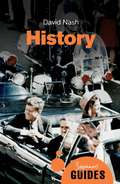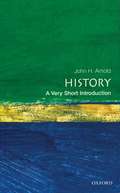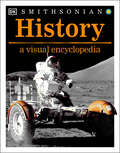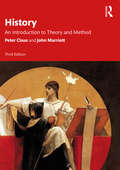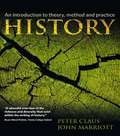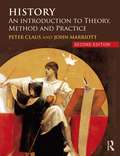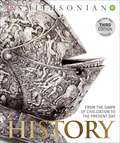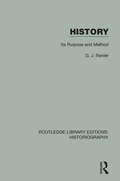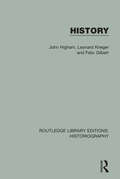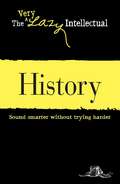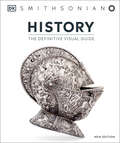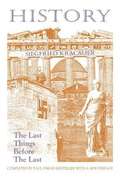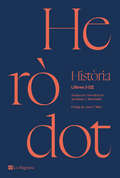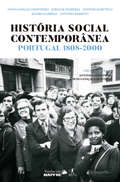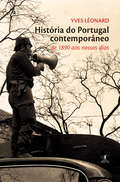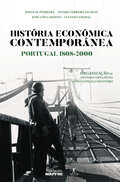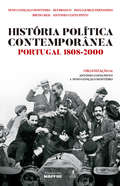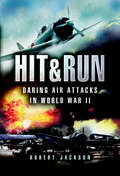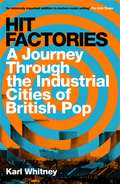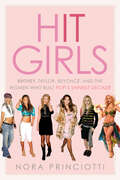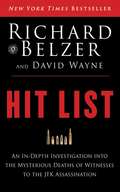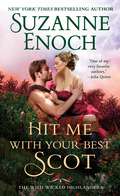- Table View
- List View
History: A Beginner's Guide (Beginner's Guides)
by David NashWhy study history? What's the point? Through compelling historical narratives, such as the assassination of President Kennedy, Dr. David Nash introduces the central elements of the subject. Readers learn how history seeks to explain, categorize and make sense of events of the past. It is a search for truth which involves searching for sources and then scrutinizing them to try and determine how reliable they are. Nash explores how new interpretations can change our understanding of what was previously an established version of history and what lasting contribution the study of history can make to society and, indeed, civilization.Ideal for those with an emerging interest in history, the book is designed to provide readers with a toolkit for further investigation of the subject.
History: A Novel
by William Weaver Lily Tuck Elsa MoranteHistory was written nearly thirty years after Elsa Morante and Alberto Moravia spent a year in hiding among remote farming villages in the mountains south of Rome. There she witnessed the full impact of the war and first formed the ambition to write an account of what history - the great political events driven by men of power, wealth, and ambition - does when it reaches the realm of ordinary people struggling for life and bread. The central character in this powerful and unforgiving novel is Ida Mancuso, a schoolteacher whose husband has died and whose feckless teenage son treats the war as his playground. A German soldier on his way to North Africa rapes her, falls in love with her, and leaves her pregnant with a boy whose survival becomes Ida's passion. Around these two other characters come and go, each caught up by the war which is like a river in flood. We catch glimpses of bombing raids, street crimes, a cattle car from which human cries emerge, an Italian soldier succumbing to frostbite on the Russian front, the dumb endurance of peasants who have lived their whole lives with nothing and now must get by with less than nothing.
History: A Very Short Introduction
by John H. ArnoldStarting with an examination of how historians work, this "Very Short Introduction" aims to explore history in a general, pithy, and accessible manner, rather than to delve into specific periods.
History: A Visual Encyclopedia (DK Children's Visual Encyclopedias)
by DKThis lavishly illustrated visual encyclopedia tells the story of our world in depth and detail from the dawn of civilization to the present day.Charting human endeavor from every angle, SI History chronicles the significant events, ground-breaking ideas, political forces, and technological advances that have shaped our planet. Every historical episode is explored and explained with the help of stunning images that bring the authoritative text to life. Important points in history, from the battle of Hastings and the storming of the Bastille to D-Day and 9/11, have clear but concise coverage, together with profiles of influential figures, such as Julius Caesar, Cleopatra, and Nelson Mandela. It&’s time to head back in time and explore the past with this striking history book, which features: - Profiles of key people who have made history.- Features on inventions, discoveries, and ideas that changed the world.- Graphics lend immediacy and impact to key statistics.- National Histories section separately chronicles key events of every countryAs each moment in history is defined and detailed, supporting panels note the causes and consequences, providing wider context and broadening our horizons. New and enhanced coverage of recent events – such as the Arab Spring – and contemporary issues such as climate change and the COVID-19 pandemic, bring the book firmly into the present. With its broad-themed approach to important historical events, this book shows that ours is a history with genes and viruses, not just battle and treaties – and the stories and biographies of men and women from every corner of the globe who have shaped today&’s world reaffirm that SI History is the story of humankind in which everyone has a part to play.
History: An Introduction to Theory and Method
by Peter Claus John MarriottThis book provides an accessible introduction to a wide range of concerns that have preoccupied historians over time. Global in scope, it explores historical perspectives not only from historiography itself but from related areas such as literature, sociology, geography and anthropology which have entered into productive dialogues with history. Clearly written and accessible, this third edition is fully revised with an updated structure and new areas of historical enquiry and themes added, including the history of emotions, video history and global pandemics. In all of this, the authors have attempted to think beyond the boundaries of the West and consider varied approaches to history. They do so by engaging with theoretical perspectives and methodologies that have provided the foundation for good historical practice. The authors analyse how historians can improve their skills by learning about the discipline of historiography, that is, how historians go about the task of exploring the past and determining where the line separating history from other disciplines, such as sociology or geography, runs. History: An Introduction to Theory and Method 3ed is an essential resource for students of historical theory and method working at both an introductory and more advanced level.
History: An Introduction to Theory, Method and Practice
by Peter Claus John MarriottWhy should history students care about theory? What relevance does it have to the "proper" role of the historian? Historiography and historical theory are often perceived as complex subjects, which many history students find frustrating and difficult. Philosophical approaches, postmodernism, anthropology, feminism or Marxism can seem arcane and abstract and students often struggle to apply these ideas in practice. Starting from the premise that historical theory and historiography are fascinating and exciting topics to study, Claus and Marriott guide the student through the various historical theories and approaches in a balanced, comprehensive and engaging way. Packed with intriguing anecdotes from all periods of history and supported by primary extracts from original historical writings, History: An Introduction to Theory, Method and Practice is the student-friendly text which demystifies the subject with clarity and verve. Key features - Written in a clear and witty way. Presents a balanced view of the subject, rather than the polemical view of one historian. Comprehensive - covers the whole range of topics taught on historiography and historical theory courses in suitable depth. Full of examples from different historical approaches - from social, cultural and political history to gender, economic and world history Covers a wide chronological breadth of examples from the ancient and medieval worlds to the twentieth century. Shows how students can engage with the theories covered in each chapter and apply them to their own studies via the "In Practice" feature at the end of each chapter. Includes "Discussion Documents" - numerous extracts from the primary historiographical texts for students to read and reflect upon.
History: An Introduction to Theory, Method and Practice
by Peter Claus John MarriottDemystifying the subject with clarity and verve, History: An Introduction to Theory, Method and Practice familiarizes the reader with the varied spectrum of historical approaches in a balanced, comprehensive and engaging manner. Global in scope, and covering a wide range of topics from the ancient and medieval worlds to the twenty-first century, it explores historical perspectives not only from historiography itself, but from related areas such as literature, sociology, geography and anthropology. Clearly written, accessible and student-friendly, this second edition is fully updated throughout to include: An increased spread of case studies from beyond Europe, especially from American and imperial histories. New chapters on important and growing areas of historical inquiry, such as environmental history and digital history Expanded sections on political, cultural and social history More discussion of non-traditional forms of historical representation and knowledge like film, fiction and video games. Accompanied by a new companion website (www.routledge.com/cw/claus) containing valuable supporting material for students and instructors such as discussion questions, further reading and web links, this book is an essential introduction for all students of historical theory and method.
History: From the Dawn of Civilization to the Present Day
by Adam Hart-DavisHistory tells the story of mankind from prehistory to the present day using a unique visual approach, filled with timelines, images of artifacts, photography, graphics, and more. Now in its third edition, this much-loved classic has been revised and updated to bring today's current events into wider context and includes all new material on the global recession, green technologies, and the Internet and social media. <p><p> This fully revised and updated third edition of History includes:<p> • Inventions, discoveries, and ideas that have shaped world history. <br> • A look at human achievement through artifacts, painting, sculpture, and architecture <br> • An examination of humankind in context as part of the natural world. <br> • Eyewitness accounts and biographies of key figures. <br> • A comprehensive timeline chronicling the key events of the countries of the world.<br> • Key contemporary issues, political developments, changes in leadership, and more. <p> Homo sapiens have remained the same species, largely unchanged in genetic makeup and anatomy since the Cro-Magnon era. By contrast, the cultural, social, and technological changes since then have been nothing less than extraordinary. History is a thought-provoking journey, revealing the common threads and forces that have shaped human history.
History: Its Purpose and Method (Routledge Library Editions: Historiography #34)
by G. J. RenierThis treatise of historical methodology, originally published in 1950 is based upon a liberal conception of history which excludes no narrator of past events from the ranks of historians. It defines history as the accurate story which preserves the memory of the past experiences of human societies. The functionof history determines its method and provides the answer to the question: how secure is our knowledge of the past? In the author’s view, history is empirical and its results are for ever provisional. The relative merits of dogmatism and scepticism are examined and several interpretations among English historians are scrutinized.
History: Politics Or Culture? Reflections On Ranke And Burckhardt (Routledge Library Editions: Historiography #1086)
by John Higham Leonard Krieger Felix GilbertThis book, originally published in 1977, is a survey of European historiography from its origins in the historians of Greece and Rome, through the annalists and chroniclers of the middle ages, to the historians of the late eighteenth century. The author concentrates on those writers whose works fit into a specific category of writing, or who have inlfuence the course of later historical writing, though he does deal with some of the more specialist forms of medieval historiography such as the crusading writers, and chivalrous historians like Froissart. He maintains that ‘modern’ history did not develop until the 18th Century.
History: Sound smarter without trying harder (The Very Lazy Intellectual)
by Adams MediaDid you skip your history homework? Have you confused Charlemagne with champagne? Fear not! Spanning from the ancient world to the present, The Very Lazy Intellectual: History introduces you to the world's most important historical figures and events. With information on Alexander the Great to the Vietnam War, you'll no longer have to refer to Cesar as the "salad dressing guy."
History: The Definitive Visual Guide (DK Definitive Visual Encyclopedias)
by DKThis lavishly illustrated visual encyclopedia tells the story of our world in depth and detail from the dawn of civilization to the present day.Charting human endeavor from every angle, SI History chronicles the significant events, ground-breaking ideas, political forces, and technological advances that have shaped our planet. Every historical episode is explored and explained with the help of stunning images that bring the authoritative text to life. Important points in history, from the battle of Hastings and the storming of the Bastille to D-Day and 9/11, have clear but concise coverage, together with profiles of influential figures, such as Julius Caesar, Cleopatra, and Nelson Mandela. It&’s time to head back in time and explore the past with this striking history book, which features: - Profiles of key people who have made history.- Features on inventions, discoveries, and ideas that changed the world.- Graphics lend immediacy and impact to key statistics.- National Histories section separately chronicles key events of every countryAs each moment in history is defined and detailed, supporting panels note the causes and consequences, providing wider context and broadening our horizons. New and enhanced coverage of recent events – such as the Arab Spring – and contemporary issues such as climate change and the COVID-19 pandemic, bring the book firmly into the present. With its broad-themed approach to important historical events, this book shows that ours is a history with genes and viruses, not just battle and treaties – and the stories and biographies of men and women from every corner of the globe who have shaped today&’s world reaffirm that SI History is the story of humankind in which everyone has a part to play.
History: The Last Things Before the Last
by Siegfried KracauerThe late Siegfried Kracauer was best known as a historian and critic of the cinema. His main intellectual preoccupation during the last years of his life was the relation between past and present, and the relation between histories in different levels of generality. Philosophy is concerned with the last things while history seeks to explain 'the last things before the last.' One after another he examined various theories of history and exposed their strengths and weaknesses.
History: வரலாறு: தமிழ் போட்டித் தேர்வுக்கான 1000 கேள்வி பதில்
by Tamil Competitive Examஇதில் தமிழ் போட்டித் தேர்வில் வரலாறு பாடத்தில் கேட்கப்பட்ட 1000 கேள்வி மற்றும் பதில்கள் கொடுக்கப்பட்டுள்ளன.
Història
by HeròdotLa primera traducció completa al català de la Història d'Heròdot «Heus aquí l'exposició de la recerca d'Heròdot d'Halicarnàs, per tal que ni els esdeveniments dels homes s'esvaneixin amb el temps,ni restin sense llustre fets grans i admirables, uns de realitzats pels grecs, d'altres pels bàrbars; ni s'oblidi, sobretot, la causa per la qual van guerrejar els uns amb els altres.» Així comença la Història d'Heròdot, el primer dels grans historiadors de l'Antiguitat. Conscient de la importància de les Guerres Mèdiques, el relat deixa palesa la vocació d'investigació i d'anàlisi de l'autor. D'una banda, perquè gestes glorioses no restin en l'oblit; d'una altra, perquè només des del passat és quan es pot explicar el present. Amb la present edició, traduïda i anotada per Rubén J. Montañés, professor de la Universitat Jaume I de Castelló i presentada per Joan Francesc Mira, us oferim la primera traducció completa al català de la Història d'Heròdot.
História Social Contemporânea: 1808-2000
by António Costa Pinto Nuno Gonçalo MonteiroUm retrato analítico e cronologicamente fundamentado da história social contemporânea portuguesa. Indispensável para compreender o passado e o presente do país. Ao longo da época contemporânea, sobretudo do século XX, foi aos indicadores sobre a sociedade que mais se recorreu quando se pretendeu destacar o "atraso" ou desfasamento português face a outros países europeus. Invocava-se então a elevadíssima mortalidade infantil, as altas taxas de analfabetismo ou a persistente emigração para identificar as arrastadas maleitas portuguesas, cuja responsabilidade se atribuía, sobretudo, ao regime político, em particular ao Estado Novo.Este volume procura responder a essas interrogações, oferecendo um retrato analítico e cronologicamente fundamentado da história social contemporânea portuguesa, cujos primórdios foram marcados pelo colapso imperial, pela independência do Brasil e pela vitória do liberalismo em 1834, depois de arrastados conflitos. Tratou-se não apenas de uma rutura política, mas também do triunfo de uma nova conceção da organização da sociedade. Os contextos e limites da sua concretização, bem como as reações que suscitou, constituem, em boa medida, a matéria tratada neste volume.Ao longo de cinco capítulos, debatem-se os impactos sociais das mudanças políticas ou, mais exatamente, de que forma se combinaram com as transformações e as continuidades na sociedade portuguesa. História Social Contemporânea: Portugal 1808-2000, um projeto conjunto da editora Objectiva, uma chancela da Penguin Random House, e da Fundação Mapfre, conta com a coordenação e organização dos professores António Costa Pinto e Nuno Gonçalo Monteiro, ambos investigadores na área de História no Instituto de Ciências Sociais da Universidade de Lisboa (ICS-UL). Ete volume conta ainda com a participação dos professores Jorge M. Pedreira professor da Faculdade de Ciências Sociais e Humanas da Universidade Nova de Lisboa, António José Telo, professor catedrático na Academia Militar de Lisboa, Álvaro Garrido, docente da Faculdade de Economia da Universidade de Coimbra e investigador do Centro de Estudos Interdisciplinares do Século XX da mesma Universidade, e António Barreto, investigador emérito do Instituto de Ciências Sociais da Universidade de Lisboa e ex-presidente da Fundação Francisco Manuel dos Santos.
História de Portugal contemporâneo
by Yves Léonard<P>História do Portugal Contemporâneo de 1890 aos nossos dias. <P><P>Quatro regimes políticos diferentes, quatro Constituições, quatro ditaduras, entre as quais a do Estado Novo salazarista - a mais longa da Europa Ocidental no século xx -, dois chefes de Estado assassinados (o rei D. Carlos, em Fevereiro de 1908, e o ditador Sidónio Pais, em Dezembro de 1918), uma transição democrática singular, uma descolonização tardia e conflituosa que reduziu brutalmente Portugal ao seu rectângulo europeu anterior à expansão iniciada no século xv, uma emigração endémica, frequentes vezes sinónimo de pobreza e de futuro incerto, e, por fim, uma europeização, corolário da modernização em ritmo acelerado, cujo apogeu seria a «Expo#98», essa exposição universal organizada em Lisboa, em 1998, para comemorar o 500.º aniversário da viagem de Vasco da Gama à Índia: são muitos os acontecimentos e tendências que pautam o longo século xx português aqui apresentado, que, por motivos de clareza pedagógica, se sucedem numa dezena de capítulos organizados por ordem cronológica, de modo a reflectirem os principais momentos de ruptura da sua história política. «Aquilo que é interessante salientar é a enorme riqueza da história contemporânea de Portugal, a complexidade das suas relações com a Europa, o seu posicionamento único na charneira de vários mundos, entre os quais sempre lançou pontes e estabeleceu cruzamentos, como se a pulsão do universal fosse sempre mais forte do que os seus limites geográficos. Este relato também põe a nu a dificuldade colectiva persistente de empreender reformas e de realizar opções estratégicas consistentes. <P>Aliás, também é surpreendente observar a capacidade de resiliência dos Portugueses, a sua maneira única de combinar resignação e revolta, motivação e recusa, decepção e entusiasmo, solidariedade e resistência perante a adversidade.» Jorge Sampaio, in Prefácio
História económica contemporânea: Portugal: 1808–2000
by Nuno Gonçalo Monteiro ANTÓNIO COSTA PINTOUma análise histórica global de um tema central do Portugal contemporâneo: a economia portuguesa dos últimos 250 anos. A economia esteve recorrentemente no centro das atenções da elite política portuguesa nos últimos duzentos e cinquenta anos. As designações foram variando. Mas desde meados do século XVIII que existiu a preocupação em colocar o país a par das «nações mais polidas da Europa». A noção do desfasamento e a ideia de encontrar meios de o superar atravessaram diferentes contextos e conjunturas, quase sempre associados a uma perceção de escassez material. Essa dimensão acabou por ser parte essencial dos projetos políticos e, até, das mudanças de regime. O público leitor e os estudiosos da sociedade e da política não podem prescindir dos indicadores económicos para a análise histórica mais global. Os territórios do «processo económico» possuem as suas metodologias e conceptualizações próprias, mas estas não devem impedir que os seus resultados possam ser comunicados e apropriados para a discussão e análise na esfera pública. Este é o objectivo primacial desta coleção que pretende aliar a legibilidade com o rigor sobre a História Contemporânea Portuguesa.
História política contemporânea: Portugal 1808-2000
by António Costa Pinto Nuno Gonçalo MonteiroUma história política indispensável para a compreensão do Portugal contemporâneo. Os últimos dois séculos, correntemente designados por História Contemporânea, estão longe de ser bem conhecidos ou de convocar uma memória partilhada dos portugueses. Além de uma imagem remota e difusa do século XIX e dos primórdios do século XX, dividem-se entre ideias fortes sobre a História portuguesa recente, como o salazarismo, a guerra colonial, o 25 de Abril de 1974 ou a adesão à União Europeia em 1986.A história da vida política de Portugal que aqui se apresenta inscreve-se em contextos mais amplos - ibéricos e atlânticos, em particular -, e partilha de cenários globais que marcaram de forma indelével os primórdios da contemporaneidade portuguesa, como as invasões francesas e as independências latino-americanas.Ao longo de cinco capítulos demarcados cronologicamente e sob a coordenação dos historiadores António Costa Pinto e Nuno Gonçalo Monteiro, os autores dão testemunho da persistente interdependência dos destinos ibero-americanos, desde o colapso imperial e a revolução liberal, na primeira metade do século XIX, até aos indícios da estagnação económica e às incertezas do projecto europeu no início do século XXI. História Política Contemporânea: Portugal - 1808-2000 nasce de um projecto maior e mais complexo, idealizado pela Fundação Mafre e publicado pela editora Objectiva entre 2013 e 2015, a História Contemporânea de Portugal: 1808-2010. Ao longo de cinco volumes dirigidos a um público alargado e diverso, mais de vinte autores debruçaram-se sobre os aspectos mais marcantes da vida contemporânea do país: a política, a economia, a sociedade, a diplomacia e a cultura. O resultado foi uma das Histórias contemporâneas de Portugal mais importantes da actualidade, um trabalho incontornável tanto a nível académico como de divulgação. Em 2019, a Fundación Mapfre e a editora Objectivavoltam a unir esforços para, com a atenta coordenação e organização dos professores António Costa Pinto e Nuno Gonçalo Monteiro, disponibilizar um volume dedicado em exclusivo à história política do Portugal contemporâneo. História Política Contemporânea: Portugal 1808-2000, um projecto conjunto da editora Objectiva, uma chancela da Penguin Random House, e da Fundación Mapfre, conta com a coordenação e organização dos professores António Costa Pinto e Nuno Gonçalo Monteiro, ambos investigadores na área de História no Instituto de Ciências Sociais da Universidade de Lisboa (ICS-UL). Este volume conta ainda com a participação dos professores Bruno Cardoso Reis, professor no ISCTE e assessor convidado do Instituto de Defesa Nacional, Paulo Jorge Fernandes e Rui Branco, ambos professores na FCSH- Universidade Nova de Lisboa.
Hit & Run: Daring Air Attacks in World War II
by Robert JacksonThe book describes some of the most daring air attacks of World War II. Some were outstanding successes and some were unmitigated disasters. North Sea Battle: In the early weeks of World War II, Britain and Germany were determined to attack one another's warships in their respective naval bases. Both RAF and Luftwaffe learned the folly of sending unescorted bombers into enemy territory. Flames over France: In May 1940, the RAF and French Air Force launched a series of desperate hit-and-run attacks on the German armored columns advancing into France and Belgium. The cost was appalling. Precision Attack: In August 1940, a newly-formed Luftwaffe unit called Erprobungsgruppe 210 (Test Group 210), equipped with bomb-carrying Messerschmitts, was assigned a mission to wipe out British radar stations in a series of lightning low-level attacks. Carrier Strike: In November 1940, a force of Fairey Swordfish torpedo-bombers crippled the Italian fleet in a daring night attack on the naval base at Taranto. By Daylight to Germany: In the summer of 1941, Blenheim squadrons of No 2 Group RAF launched a series of daring low-level attacks on power stations and naval facilities in northern Germany. The principal target was Bremen, at the extreme limit of the bombers' range. Plus ... Mission to Augsburg, Target Tokyo, Dead on Time, Extreme Danger Mission, The Raid That Failed, The Anniversary Raids, Mosquito Mission, The Luftwaffe's Last Fling
Hit Factories: A Journey Through the Industrial Cities of British Pop
by Karl WhitneyAfter discovering a derelict record plant on the edge of a northern English city, and hearing that it was once visited by David Bowie, Karl Whitney embarks upon a journey to explore the industrial cities of British pop music.Manchester, Liverpool, Newcastle, Leeds, Sheffield, Hull, Glasgow, Belfast, Birmingham, Coventry, Bristol: at various points in the past these cities have all had distinctive and highly identifiable sounds. But how did this happen? What circumstances enabled those sounds to emerge? How did each particular city - its history, its physical form, its accent - influence its music? How were these cities and their music different from each other? And what did they have in common?Hit Factories tells the story of British pop through the cities that shaped it, tracking down the places where music was performed, recorded and sold, and the people - the performers, entrepreneurs, songwriters, producers and fans - who made it all happen. From the venues and recording studios that occupied disused cinemas, churches and abandoned factories to the terraced houses and back rooms of pubs where bands first rehearsed, the terrain of British pop can be retraced with a map in hand and a head filled with music and its many myths.
Hit Factories: A Journey Through the Industrial Cities of British Pop
by Karl WhitneyAfter discovering a derelict record plant on the edge of a northern English city, and hearing that it was once visited by David Bowie, Karl Whitney embarks upon a journey to explore the industrial cities of British pop music.Manchester, Liverpool, Newcastle, Leeds, Sheffield, Hull, Glasgow, Belfast, Birmingham, Coventry, Bristol: at various points in the past these cities have all had distinctive and highly identifiable sounds. But how did this happen? What circumstances enabled those sounds to emerge? How did each particular city - its history, its physical form, its accent - influence its music? How were these cities and their music different from each other? And what did they have in common?Hit Factories tells the story of British pop through the cities that shaped it, tracking down the places where music was performed, recorded and sold, and the people - the performers, entrepreneurs, songwriters, producers and fans - who made it all happen. From the venues and recording studios that occupied disused cinemas, churches and abandoned factories to the terraced houses and back rooms of pubs where bands first rehearsed, the terrain of British pop can be retraced with a map in hand and a head filled with music and its many myths.
Hit Girls: Britney, Taylor, Beyoncé, and the Women Who Built Pop's Shiniest Decade
by Nora PrinciottiAn entertaining and deeply nostalgic dive into how female pop stars broke through the music industry in the 2000s and altered the cultural landscape forever, from the Ringer writer and Every Single Album podcast cohost&“Hit Girls bridges our butterfly-clipped, bedazzled past with today&’s music world, revealing how the pop songs we belted in our bedrooms shaped everything we&’re streaming now.&”—Kate Kennedy, New York Times bestselling author of One in a MillennialLow-rise jeans, butterfly clips, The Lizzie McGuire Movie, and Paris Hilton&’s nights out. The early 2000s were a time of major moments in fashion, media, celebrity culture, and especially music. The aughts were a particularly fruitful era for female artists—still the only decade in the history of recorded music when women made up more than half the list of highest-grossing performers—and especially pop stars. Artists such as Britney Spears, Taylor Swift, Rihanna, and Beyoncé were leading the charge—their success not only leading to a new respect for female artists, but for pop stardom itself.In Hit Girls, Nora Princiotti examines how these artists redefined the role of the pop star within the music industry and culture more broadly, and fundamentally set the stage for the women who top the charts today. Princiotti unpacks the shifts in genre, technology, and celebrity culture that sparked this evolution through the stories of the biggest names in aughties pop. Like how Britney opened the bubblegum floodgates at the start of the decade, inspiring both copycats like Christina Aguilera and Jessica Simpson and mall punk antagonists like Avril Lavigne and Ashlee Simpson. Or how innovations in technology led to the rise of EDM as Rihanna experimented with sound while Ke$ha and Katy Perry embraced the &“party anthem.&”Along the way, Princiotti explores how celebrity evolved alongside the changes in media from the tabloid days à la Lindsay Lohan to MySpace, Instagram and how Taylor created one of the largest, most dedicated fandoms the world has ever seen.The ultimate love letter to pop music, Hit Girls celebrates the women who revolutionized the genre, inspired the next generation, and—in some cases—are burning brighter than ever.
Hit List: An In-Depth Investigation into the Mysterious Deaths of Witnesses to the JFK Assassination
by Richard Belzer David WayneRichard Belzer and David Wayne are back to set the record straight after Dead Wrong; this time they're going to uncover the truth about the many witness deaths tied to the JFK assassination. For decades, government pundits have dismissed these "coincidental" deaths, even regarding them as "myths" as "urban legends."Like most people, Richard and David were initially unsure about what to make of these 'coincidences'. After all, events don't "consult the odds" prior to happening; they simply happen. Then someone comes along later and figures out what the odds of it happening were. Some of the deaths seemed purely coincidental; heart attacks, hunting accidents. Others clearly seemed noteworthy; witnesses who did seem to know something and did seem to die mysteriously.Hit List is a fair examination of the evidence of each case, leading to (necessarily) different conclusions. The findings were absolutely staggering; as some cases were clearly linked to a "clean-up operation" after the murder of President Kennedy, while others were the result of 'other forces'. The impeccable research and writing of Richard Belzer and David Wayne show that if the government is trying to hide anything, they're the duo who will uncover it.
Hit Me With Your Best Scot (The Wild Wicked Highlanders #3)
by Suzanne EnochA Buzzfeed “19 Anticipated Books That Have Finally Been Released For You To Read”The final book in the wickedly seductive new Scottish historical romance trilogy from New York Times bestselling author Suzanne Enoch, Hit Me With Your Best Scot!The MacTaggert brothers have one task:Find English brides or lose their land!Coll MacTaggert, Viscount Glendarril, is a big, brawny Highlander who doesn’t like being told what to do—not even by his exasperated English mother who is determined to see her eldest son wedded and bedded. However, when he comes to the rescue of an irresistibly beautiful woman, Coll discovers that he may have found his perfect match…The challenge isn’t that Persephone Jones is famous, wealthy, independent, and smarter than anyone he knows.The problem is that she isn't interested in marrying any man—especially not a hot-headed Scot—even if he is the only man who seems to understand who she really is even when she’s not sure herself. When Coll learns that Persephone is actually a lady-in-hiding and someone is willing to kill her for what she stands to inherit…Well, Coll has never been one to turn down a fight. When hearts are involved, nothing comes between a Highlander and his lady.
